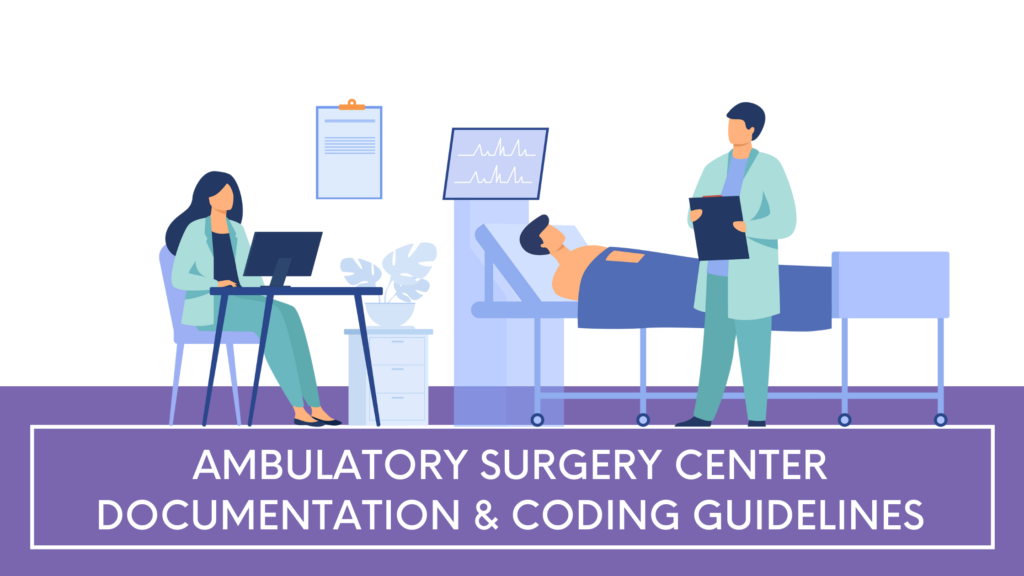Benefits of Ambulatory Surgery Centers
Often times patients prefer ASCs over hospitals, and physicians, whether they have ownership in the ASC or not, prefer to perform surgeries in these locations. Reasons for this include:- Convenient for the patient
- Inpatient care is not needed
- Flexibility and convenience of surgery scheduling
- Costs are lower
- High level of physician autonomy
- Top of the line supplies and technology
Ambulatory medical billing and coding differ quite a bit from other inpatient billing and coding. This is because the health services are provided through hospitals or ambulatory surgical centers (ASC) at an outside location, making the service and outpatient service.
Coding for Ambulatory Surgery Centers is a specialty unto itself. It is a facility service, but Medicare requrires ASC’s to send their bills to the professional fee (Part B) payers, but using the facility fee (Part A) claim form. There is a whole different set of regulations and bundling edits to use for ASCs. Many ASCs use the same codes as the surgeons, but that can be a revenue “kiss of death” and create compliance exposure for every shareholder-or-partner in the ASC. The rules of the game are different for ASCs than for surgeons or for hospitals; at times ASCs must follow the rules for doctors, and at other times they must adhere to the hospital’s rules. A simple modifier used incorrectly can deliver a “fatal blow” to an otherwise clean claim for thousands of dollars
AAPC has this specialty exam available:
Ambulatory Surgical Center Medical Coding Billing, Certified ASC Coder (CASCC™) Credential - AAPC
Ambulatory Surgical Centers (ASC) medical coding training and certification.

Ambulatory Surgery Center Documentation & Coding Guidelines
Understanding the guidelines for ASC documentation and coding can be a daunting task and requires an expert to address any deficiencies.
 practolytics.com
practolytics.com
For Medicare patients, you cannot perform just any procedure in the ASC setting. Medicare has an “approved” list of procedures for the ASC that CMS has determined not to pose a significant safety risk, and that is not expected to require an overnight stay following the surgical procedure. Medicare publishes this list of covered procedures annually. Updates are published quarterly, or as necessary.
The list of approved procedures is based on the criteria:
- They are NOT emergent or life-threatening (for example, a heart transplant or reattachment of a severed limb).
- They cannot be performed safely in a physician’s office.
- They can be elective.
- They can be urgent.
- Procedures also do not involve major blood vessels or result in major blood loss, and cannot involve prolonged invasion of a body cavity.
Understanding ASC Coding and Billing – Leading Medical Billing Services
Ambulatory Surgical Centers (ASC) Center
SpotlightImportant Links
Coding and Billing
- Ambulatory Surgical Center (ASC) Payment
- ASC Payment System Questions and Answers
- CMS Recognized P-C IOLs and A-C IOLs - Updated 6/21/2021 (PDF)
- New Technology Intraocular Lenses (NTIOLs)
- Electronic Billing & EDI Transactions
- HCPCS - General Information
- ICD-10 Coordination and Maintenance Committee
- ICD-10
- Claim Adjustment Reason and Remittance Advice Remark Codes - The latest HIPAA codes are available at the Washington Publishing Company (WPC) Website.
CMS Manuals & Transmittals
Policies/Regulations
- Ambulatory Surgical Center (ASC) Payment
- ASC Regulations and Notices
- Quarterly Provider Updates
- Administrative Simplification Overview
- Laser-Assisted Cataract Surgery and CMS Rulings 05-01 and 1536-R (PDF)
Enrollment & Participation
- Ambulatory Surgery Centers
- Medicare Provider-Supplier Enrollment
- Conditions for Coverage (CfCs) & Conditions of Participations (CoPs)
- State Survey Agency Directors and CMS Regional Offices


